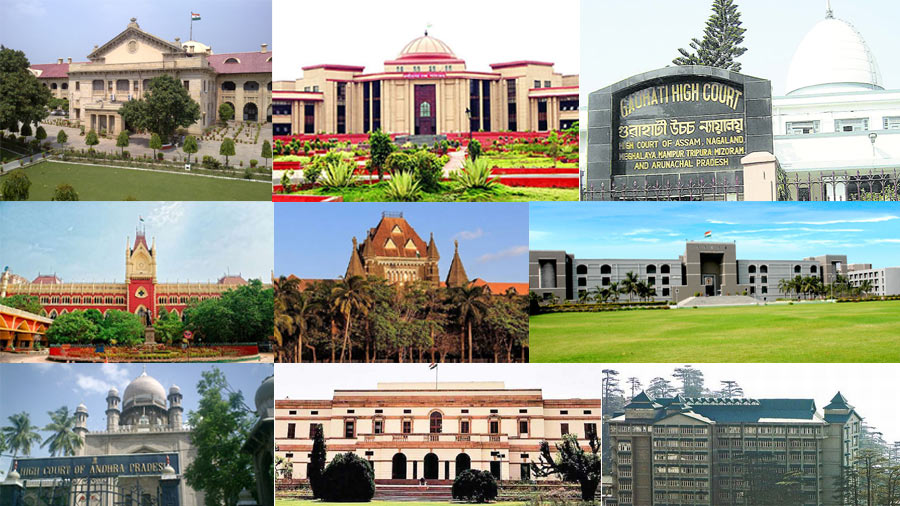Supreme Court information:
The highest judicial power at the state level is with the High Court in the country. There are a total of 25 High Courts in the country, out of which seven have multiple courts. They have jurisdiction over a state, union territory or a group of states. The oldest High Court was established in the year 1862 in Calcutta. Civil and criminal lower courts and tribunals function under the High Court. But all the High Courts come under the Supreme Court of India.
List of current Chief Justices of Indian states:
| Name of the court | Chief Justice | (Date of appointment as CJ/ACJ)-(Date of superannuation) |
| Allahabad High Court | Pritinkar Diwakar | (26 March 2023 - 21 November 2023) |
| Andhra Pradesh High Court | Dheeraj Singh Thakur | (28 July 2023 - 24 April 2026) |
| Bombay High Court | Devendra Kumar Upadhyay | (29 July 2023 -15 June 2027) |
| Calcutta High Court | T. S. Sivagnanam | (31 March 2023 - 15 September 2025) |
| High Court of Chhattisgarh | Ramesh Sinha | (29 March 2023 - 4 September 2026) |
| Delhi High Court | Satish Chandra Sharma | (28 June 2022 - 29 November 2023) |
| Gauhati High Court | Sandeep Mehta | (15 February 2023 - 10 January 2025) |
| Gujarat High Court | Sunita Agarwal | (23 July 2023 - 29 April 2028) |
| High Court of Himachal Pradesh | MS Ramachandra Rao | (30 May 2023 - 6 August 2028) |
| Jammu and Kashmir High Court | N Koteshwar Singh | (15 February 2023 - 28 February 2025) |
| Jharkhand High Court | Sanjay Kumar Mishra | (20 February 2023 - 28 December 2023) |
| Karnataka High Court | Prasanna B Varale | (15 October 2022 - 22 June 2024) |
| Kerala High Court | Ashish Jitendra Desai | (22 July 2023 - 4 July 2024) |
| High Court of Madhya Pradesh | Ravi Malimath | (14 October 2021 - 24 May 2024) |
| Madras High Court | Sanjay V. Gangapurwala | (28 May 2023 - 23 May 2024) |
| Manipur High Court | M. V. Muraleedharan | (6 February 2023 – 15 April 2024) |
| Meghalaya High Court | Sanjib Banerjee | (24 November 2021 - 1 November 2023) |
| Orissa High Court | Subhasis Talapatra | (8 August 2023 - 3 October 2023) |
| Patna High Court | K Vinod Chandran | (29 March 2023 - 24 April 2025) |
| Punjab and Haryana High Court | Ravi Shankar Jhan | (06-Oct-2019 - 13-Oct-2023) |
| Rajasthan High Court | Augustine George Messiah |
(30 May 2023 - 11 March 2025) |
| Sikkim High Court | Vishwanath Somadder | (12 October 2021 - 14 December 2025) |
| Telangana High Court | Alok Aradhe | (23 July 2023 - 12 April 2026) |
| Tripura High Court | Aparesh Kumar Singh | (17 April 2023 - 6 July 2027) |
| High Court of Uttarakhand | Vipin Sanghi | (28 June 2022 - 26 October 2023) |
Appointment of Chief Justice of Supreme Court:
All the judges of the Supreme Court are appointed by the President of India in consultation with the Supreme Court. The Chief Justice of the Supreme Court, before advising the President in this regard, compulsorily consults a group of four senior most judges and on the basis of the advice received from this group gives advice to the President. According to Article 124, while appointing the Chief Justice, the President shall, of his choice, take the advice of the judges of the Supreme Court.
At the time of appointment of other judges, he has to compulsorily follow the advice of the Chief Justice. According to Article 214 of the Constitution, there is a provision for a High Court for each State. Under Article 231, Parliament has the power to establish High Courts for two or more states. The High Court has been declared as a Court of Record in accordance with Article 215.
Qualifications of a Supreme Court Judge:
- The person should be a citizen of India.
- Should have served as a Judge of a High Court for at least five years or as a Judge of two or more Courts for at least five consecutive years.
- Should have been an advocate in any High Court or Courts for ten consecutive years.
- That person should, in the opinion of the President, be an eminent jurist.
- To become a judge of the Supreme Court, it is mandatory for a judge to have five years experience in the High Court of any state and he should not have completed the age of 62 years.
Tenure of Supreme Court Judges:
The retirement age of the judges of the Supreme Court of India is 65 years. Judges can be removed by the President only on the basis of a resolution passed by both the Houses of Parliament by a two-thirds majority on the evidence of misbehavior (impeachment) or incapacity.
Read also:
- List of Chief Justice of India from 1950 to 2023 🔗
- List of All High Courts in India 2023 🔗
- Collegium System - Method of Appointments of Supreme Court Judges 🔗
- List of High Courts in India 2023: Establishment Act and Jurisdiction 🔗

